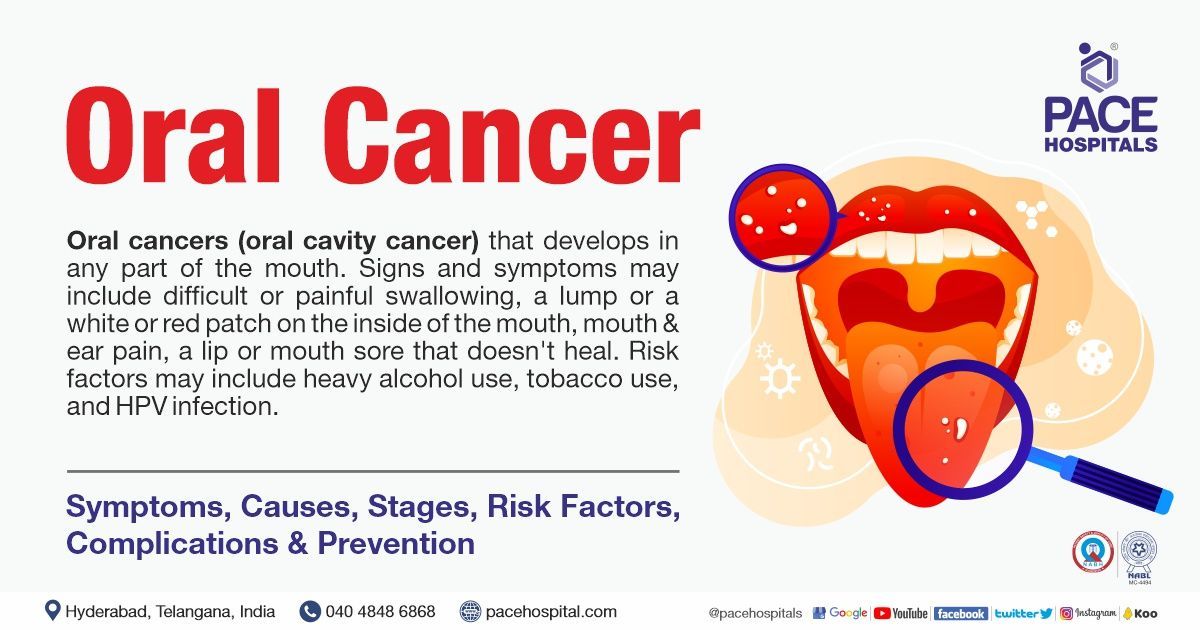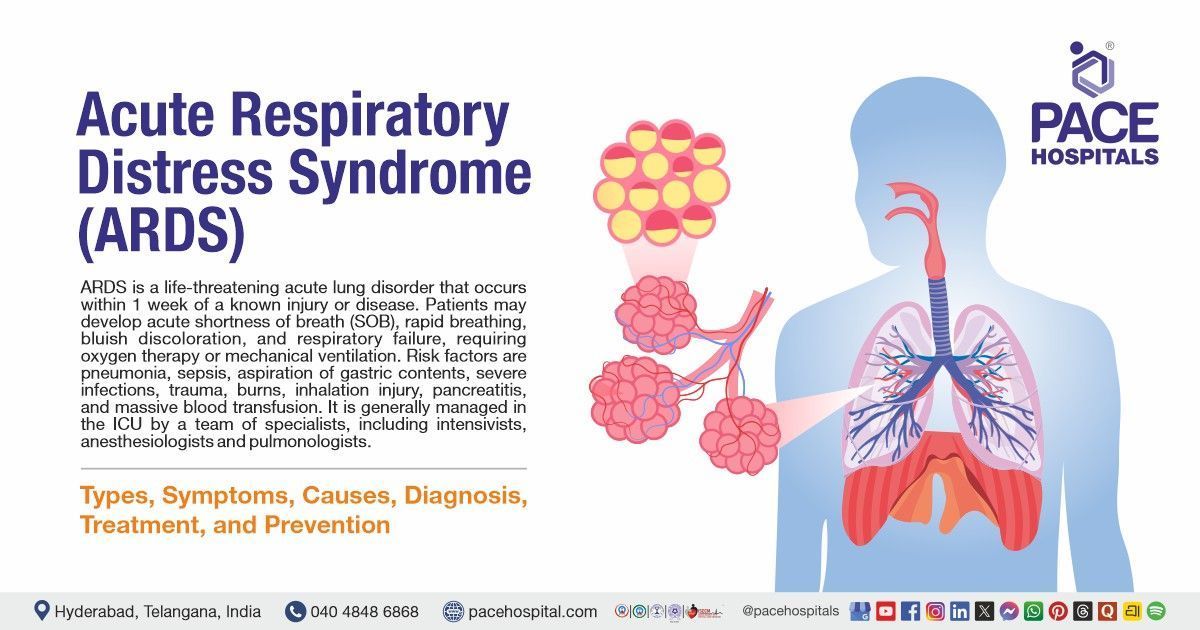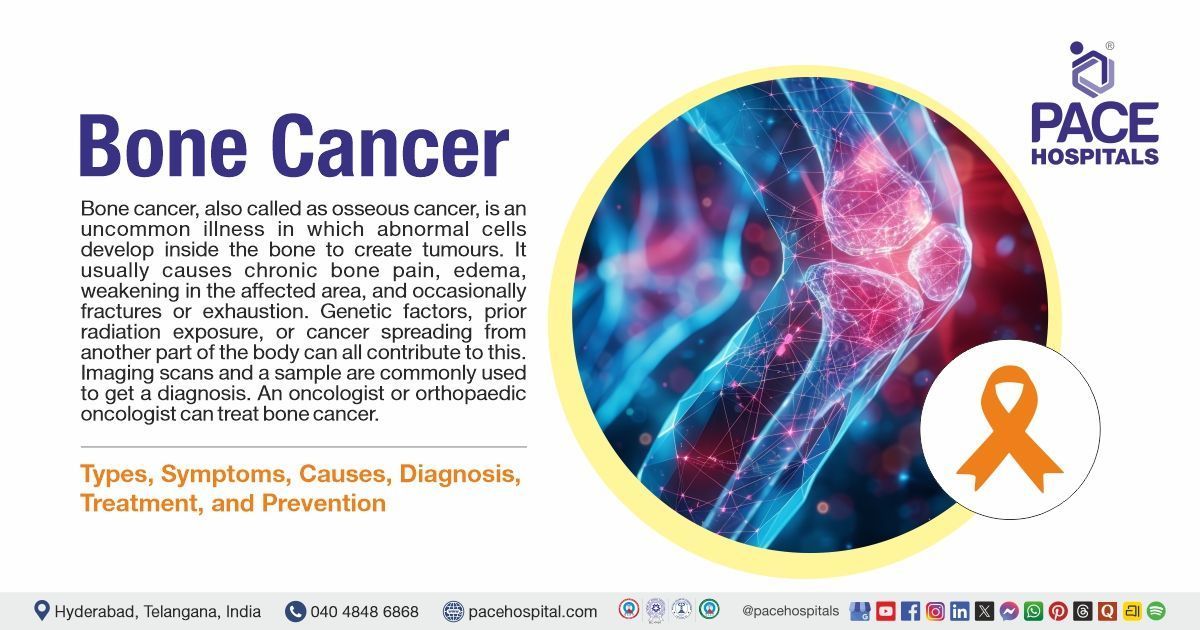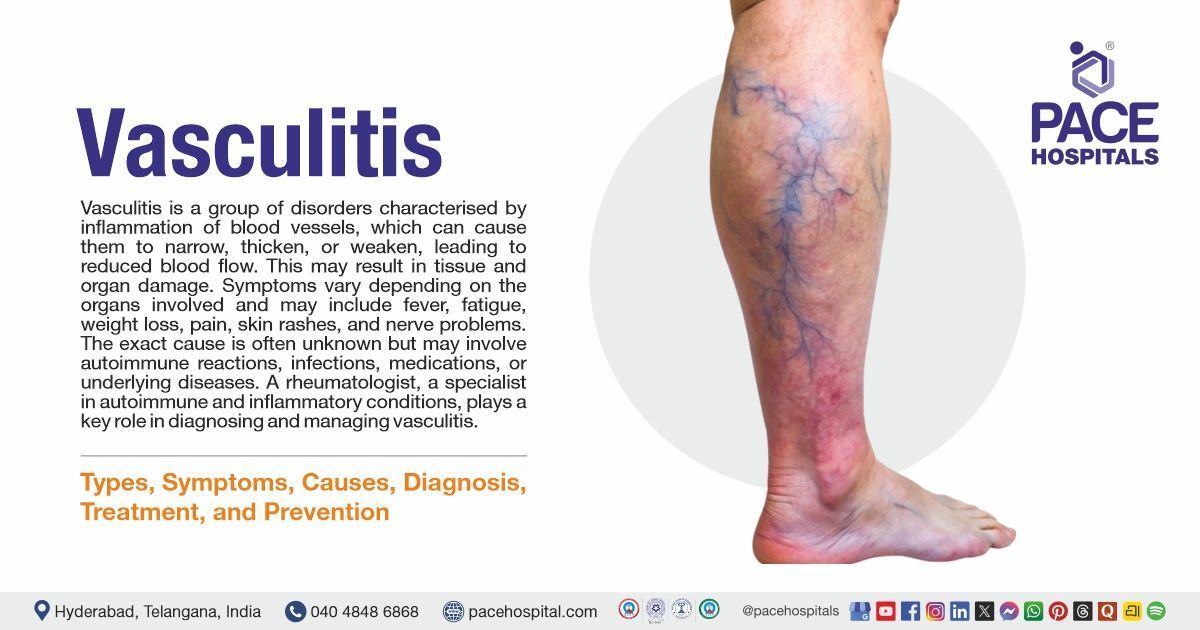Oral Cancer – Symptoms, Causes, Stages, Risk Factors, Complications & Prevention
PACE Hospitals
Overview | Types | Causes | Symptoms | Signs | Risk Factors | Complications | Diagnosis | Treatment | Prevention | FAQs | When to consult a Doctor
Oral cancer definition
When healthy cells multiply out of control, forming a tumour (a mass of cells) which could be cancerous or benign. If cancer begins in the buccal cavity or oral cavity, it is called oral cancer.
The oropharynx, oral cavity and other parts of the head and neck provide the ability to chew, swallow, breathe, and talk. The oral cavity includes the following:
- Lips
- Front 2/3rds of the tongue
- Hard palate (Roof of the mouth)
- Gingiva (Upper and lower gums)
- The floor of the mouth under the tongue
- Buccal mucosa (Lining of the lips & cheeks)
- Retromolar trigone (region behind wisdom teeth
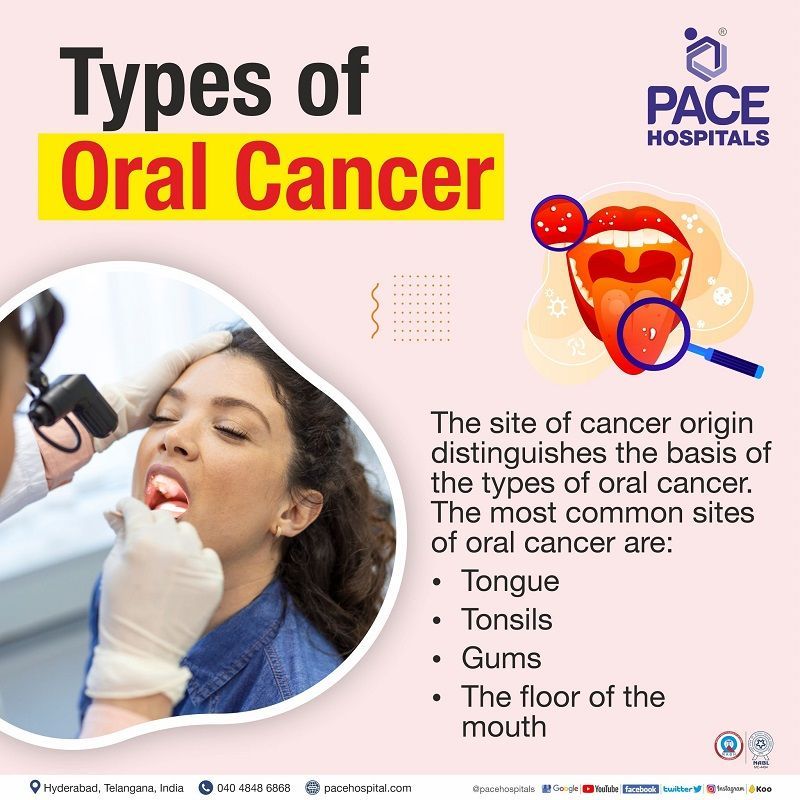
Types of Oral Cancers
The site of cancer origin distinguishes the basis of the types of oral cancer. The most common sites of oral cancer are:
- Tongue
- Gums
- Palate (roof of the mouth)
- Mouth linings (labial/buccal and alveolar mucosa)
Histologically, oral cancers are classified based on the tissue from which they origin. They are:
- Squamous cell carcinoma
- Adenocarcinoma
- Sarcoma
- Oral malignant melanoma
- Lymphoma
The most common type of mouth cancer is the squamous cell carcinoma, as squamous cell epithelium is predominantly found in many areas of the body, including the inside of the mouth and in the skin. Around 90% of the oral cancers are squamous cell carcinoma.
Adenocarcinoma is the cancer which develops in the glands that line the organs. In the buccal cavity, adenocarcinoma is the cancer of salivary glands.
Sarcomas are the cancer developing in bone or in the soft tissues of the body, such as adipose tissue (fat), fibrous tissue, cartilage, muscle, blood vessels, etc. Soft tissue sarcomas in the oral maxillofacial region are less frequent. Their management requires a multidisciplinary approach.
Melanoma cancers develop in the melanocytes (the cells that give colour to the skin) which usually develop in the skin. One of the most aggressive forms of malignant tumour, oral malignant melanoma is a rare malignant tumour that has a higher proclivity for metastasis (cancer spread).
Lymphomas are the cancers of the lymphatic system which includes the network of bone marrow, spleen, thymus gland and lymph nodes (also called lymph glands). Lymphomas in the oral cavity are rarely seen but their development is inclined in patients suffering from acquired immunodeficiency syndrome (AIDS).
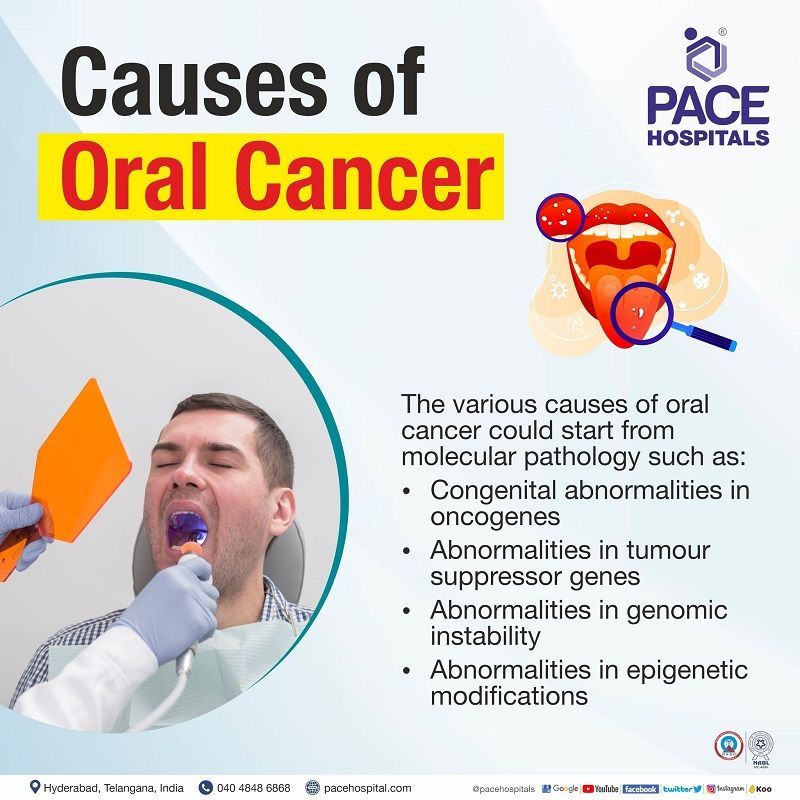
Causes of Oral Cancer
Oral carcinogenesis, like other cancers, progresses from dysplasia to invasive phenotypes. Genetic and proteomic approaches have revealed molecular pathology. Contributions by congenital abnormalities in oncogenes, tumour suppressor genes, genomic instability, and epigenetic modifications could cause oral oncogenesis. Various risk factors could play a key role in enhancing the aforementioned genetic abnormalities.
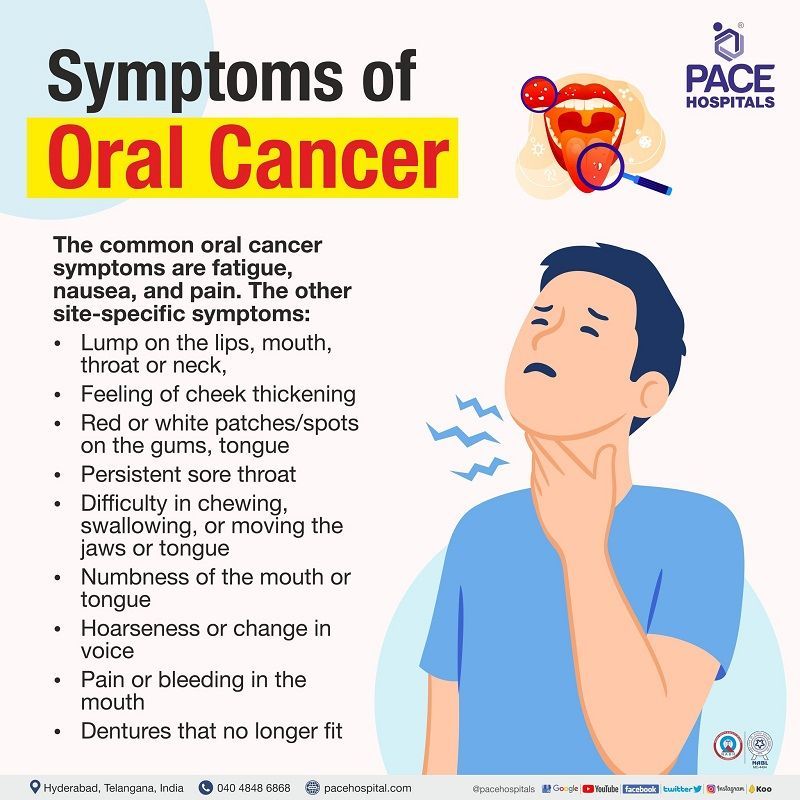
Oral Cancer Symptoms
A few of the common oral carcinoma symptoms include fatigue, nausea, and pain. In other patients, the symptoms are not presented. Dentists often identify oral cancer during regular exams. The most common symptoms are:
- Lump on the lips, mouth, throat or neck, or a feeling of cheek thickening
- Red or white patches/spots on the gums, tongue, tonsil, or lining of the mouth
- Persistent sore throat or feeling of something caught up in the throat
- Difficulty in chewing, swallowing, or moving the jaws or tongue
- Numbness of the mouth or tongue
- Loosening of teeth or toothache
- Hoarseness or change in voice
- Pain or bleeding in the mouth
- Dentures that no longer fit
- Unexplained weight loss
- Anorexia at later stages
- Ear and/or jaw pain
- Chronic bad breath
- Changes in speech
- Fatigue
Early Signs of Oral Cancer
- Tongue cancer: The most common early symptom of tongue cancer is a painful sore on the tongue that increases gradually and doesn't heal, and bleeds easily.
- Tonsil cancer: The earliest symptom of tonsil cancer is an enlarged tonsil, but if both tonsils are swollen or enlarged, it not is tonsil cancer.
- Gums cancer and cancer at the floor of the mouth: Ulceration was the most frequent clinical appearance, followed by lesions, induration (thickening and hardening of soft tissues) and rupture.
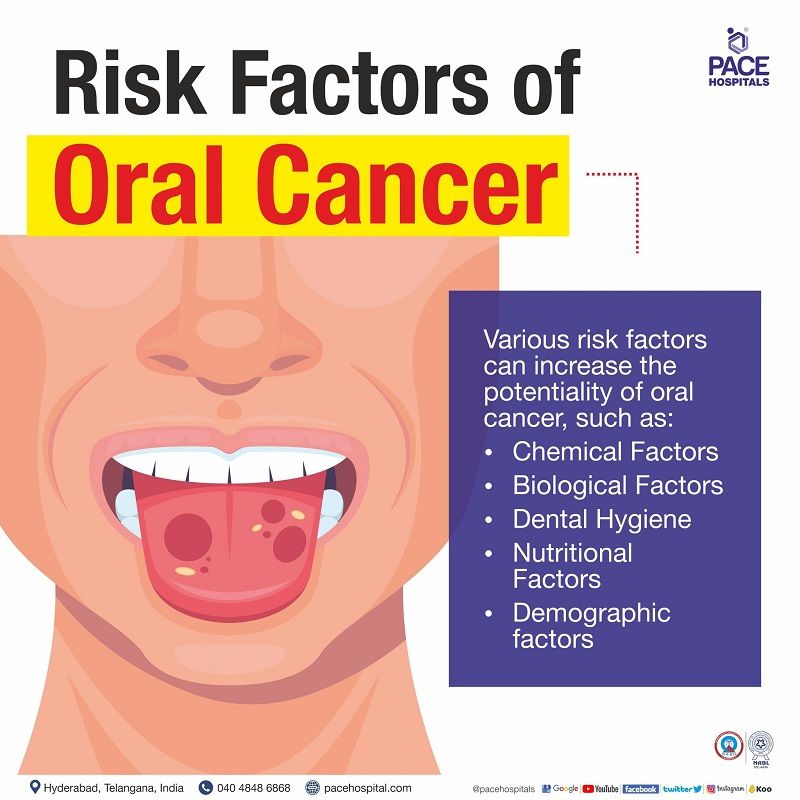
Risk factors of Oral Cancer
Various risk factors can increase the potentiality of oral cancer, such as:
- Chemical Factors
- Biological Factors
- Dental Hygiene and Related Factors
- Nutritional Factors
- Demographic factors
Chemical Factors
- Tobacco - There are ample amounts of evidence demonstrating that the consumption of tobacco in various forms, including (smoking, chewing, and in betel quid) could have a carcinogenic impact in the oral cavity, with smoking being the most standard form of tobacco use (cigarettes, cigars, pipe and bidi, hookah, or chillum). In some parts of India (Mizoram and other northeast regions.), tobacco smoke is dissolved in water (“smoke on the water”) which is another peculiar form of tobacco use.
- Alcohol - Multiple studies have linked alcoholism to oral cancer and is exceptionally high in people indulging in alcoholism and tobacco use. Individuals consuming more than 170 g of whiskey/day demonstrate ten times increased risk of oral cancer.
- Marijuana - studies showed the increased average risk for patients using marijuana.
Biological Factors
- Viruses - Viruses are capable of hijacking host cellular apparatus, modifying DNA and inducing proliferative changes in the cells. Human papillomavirus (HPV) Epstein Barr Virus (EBV), human herpesvirus-8 (HHV-8) and cytomegalovirus and Herpes simplex virus (HSV) have been established in recent years as causative agents of oral cancers. HSV-1, or "oral herpes", is commonly associated with sores around the mouth and lip and has been suggested to be a causative agent of oral cancers. Approximately 23.5% of oral cancers are caused by HPV - an infection of the middle throat and mouth that can contract unhealthy sexual practices and indulgence with multiple sexual partners.
- Candida - Candida plays a role in initiating oral cancer by causing nodular leucoplakia (thick, white patches inside mouth surfaces), increasing the tendency for dysplasia and malignant transformation.
Dental Hygiene and Related Factors
- Oral hygiene and the incidence of oral cancer are inversely proportional. Sharp teeth can cause poor oral hygiene and prolonged irritation, paving the way for the development of oral cancer. The carcinogenic action of tobacco is greatly enhanced by poor oral hygiene and dental sepsis.
Nutritional Factors
- Dietary deficits may potentially cause oral cancer. A reduced risk can be seen with a diet rich in fruits and vegetables.
Demographic factors
- Gender – Male individuals are more likely to develop oral cancers when compared with women.
- Fair skin - Fair skin is linked to a higher risk of lip cancer.
- Age - despite the development of oral cancer at any age, patients older than 45 years are more prone to it.
- Prolonged sun exposure – without sun protection measures can increase lip cancer.
Complications of Oral Cancer
There could be several oral cancer complications, including medical phenomena such as dysphagia (difficulty swallowing) and aphasia (speech problems). Since oral cancer occurs in the orofacial part, patients may also suffer from self-esteem, social anxiety disorder, and reclusive ness (withdrawal from social life), considering an unaesthetic facial consequence.
A Taiwanese study from 2021 demonstrated an increased inclination towards the development of depression is seen in oral cancer patients. It is especially pronounced in patients suffering from tongue cancer, as they experience worse functional dysphagia when compared with patients suffering from oral cancer in other locations.
While oral surgery can significantly affect the treatment of cancer, it often causes significant function loss. Any side effects of chemoradiotherapy, such as mucositis, pharyngitis-related dysphagia, nausea, vomiting, and masticatory disorders, could further plunge the patient into their mental dungeon through social isolation. The result is even more pronounced when combined with painkillers, especially narcotic analgesics, as they are reported to possess a higher risk of depression.
As emotional instability is seen in all kinds of oral patients, the comprehensive treatment plan must subsume psychological counselling for both the patients and their family members, as the latter also experience emotional distress. The steady job of caregiving can negatively impact the connotations of psychosocial aspects.
Till date, the psychosocial interventions combined with the regular treatment of oral cancer demonstrated an overall positive effect on the patients. Although being a caregiver is challenging enough, additional unique psychological training can greatly amplify the patient's care and reduce the caregivers' mental burden.
Oral Cancer Diagnosis
While there are various oral cancer tests for the diagnosis, it must be understood that not all of them will be used for every suspected patient. The oncologist takes into consideration the following before selecting the appropriate tests for diagnosis:
- Biopsy
- Fine needle aspiration biopsy
- Oral brush biopsy
- HPV testing
- X-ray
- Barium swallow/modified barium swallow
- Computed tomography (CT or CAT) scan
- Magnetic resonance imaging (MRI)
- Positron emission tomography (PET) or PET-CT scan
Oral Cancer Treatment
The primary treatment options for oral or are surgery, radiation therapy, medication-based, and comprehensive dental treatment.
Surgery
- Primary tumour surgery (surgery of tumour and healthy tissue surrounding it)
- Glossectomy (partial or total removal of the tongue)
- Mandibulectomy (partial or total removal of the jawbone)
- Maxillectomy hard palate (roof of the mouth) removal.
- Neck dissection (done to prevent the spread of cancer to neck lymph nodes)
- Micrographic surgery (visible tumour and surrounding tissue are removed)
- Tracheostomy (an opening in the neck if cancer blocks the airway)
- Gastrostomy tube (for cancer patients with swallowing difficulty)
- Reconstructive surgery (needed if large portions of tissue are removed)
Radiation therapy
- External-beam radiation therapy (targets with a machine's radiation beam)
- Internal radiation therapy (brachytherapy; radiation given using implants)
Therapies using medication
- Chemotherapy
- Immunotherapy (biologic therapy)
- Targeted therapy
- Comprehensive dental treatment
Why Choose PACE Hospitals?
Expert Super Specialist Doctors
Advanced Diagnostics & Treatment
Affordable & Transparent Care
24x7 Emergency & ICU Support
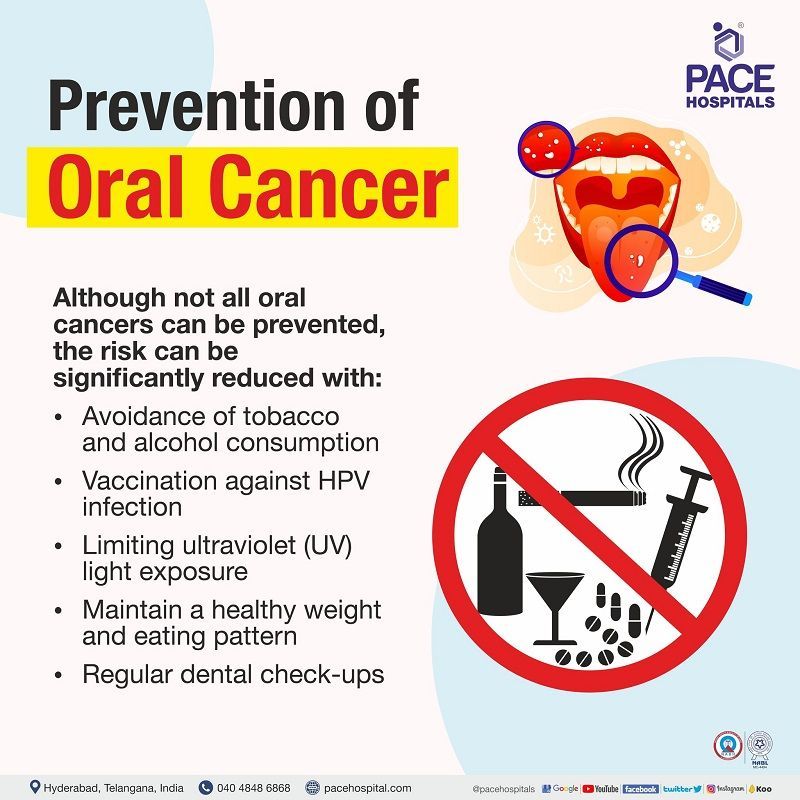
Prevention of Oral Cancer
Although not all oral cancers can be prevented, the risk can be significantly reduced with specific preventative tips given below:
- Avoid tobacco and alcohol: Cessation of alcoholism, smoking and oral tobacco product usage is the best way to limit the risk of getting these cancers. Quitting tobacco use and alcoholism also greatly helps, even with many years of indulgence.
- Vaccination to avoid HPV infection: HPV infection can be contracted with unhealthy sexual practices and indulgence with multiple sexual partners. Vaccines can reduce the risk of infection not only for oral cancer but also for cancers of the penis, anus, vulva, and vagina.
- Limit exposure to ultraviolet (UV) light: Ultraviolet radiation is an avoidable risk factor for cancer of the lips. Limiting outdoor time during the middle of the day and wearing a wide-brimmed hat and sunscreen while going out can reduce the risk.
- Maintain a healthy weight and eating pattern: Weak immunity due to poor nutrition must be corrected by a healthy eating pattern (more plant-based foods, non-starchy vegetables and whole fruit) to reduce oral cancer risk.
- Get regular dental check-ups: Leucoplakia (white patches in the mouth) or erythroplakia (red patches in the mouth) could be pre-cancer growths. Regular dental check-ups can detect cancer early.
Frequently Asked Questions (FAQs) on Oral Cancer
When to consult a doctor for oral cancer?
Consult a doctor for oral cancer if mouth sores, lumps, or unusual patches inside the mouth do not heal within two weeks or if they start making it difficult to eat, speak, or swallow. Identifying the disease at an early stage offers the best opportunity for effective treatment.
Warning signs to watch for include:
- Mouth ulcers or sores that don’t heal
- White or red patches in the mouth
- Lumps or thickened areas on the tongue, cheek, or gums
- Trouble chewing, swallowing, or moving the jaw
- Unexplained numbness, pain, or bleeding
- Persistent sore throat or voice changes
An
oral cancer specialist, such as an ENT doctor, oral and maxillofacial surgeon, or oncologist, can diagnose the condition and recommend suitable oral cancer treatment like surgery or radiation. Urgent care is needed if there is severe pain, heavy bleeding, or fast-growing mouth lesions.
Share on
Request an appointment
Fill in the appointment form or call us instantly to book a confirmed appointment with our super specialist at 04048486868

